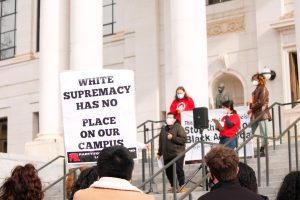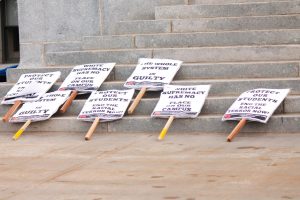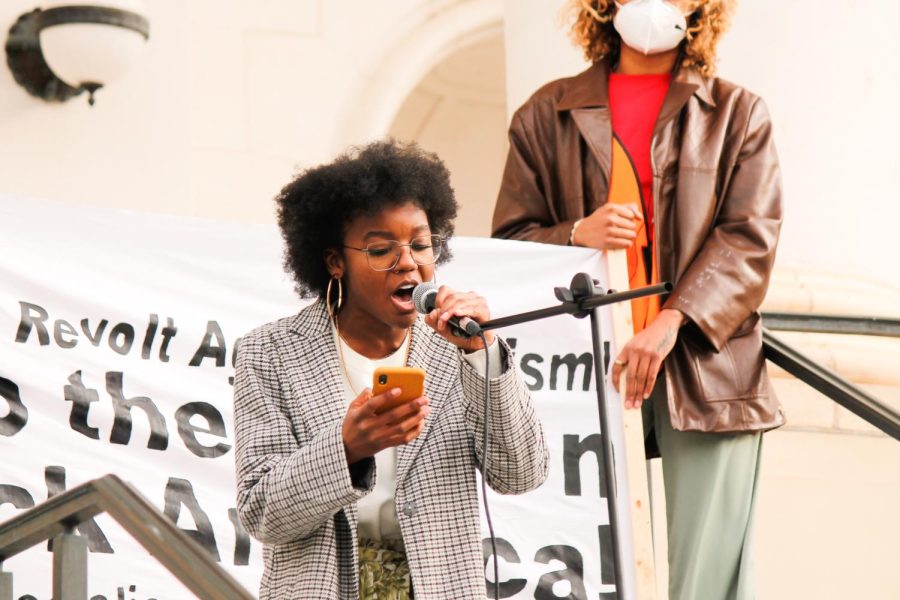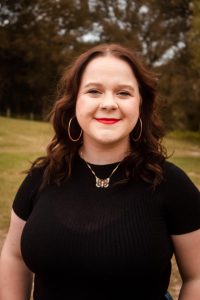U Community Continues to Address and Push for Change Following Racist Incidents on Campus
Hanna Msiska speaks on the steps of the John R. Park building at a protest on Jan. 7, 2021. (Photo by Natalie Colby | The Daily Utah Chronicle)
January 7, 2022
Protest Held to “Stand Against U of U Racist Attacks”
As tours of prospective University of Utah students walked by and people from inside the John R. Park building looked on, a group of around 50 people met outside on Jan. 7, 2021 to protest recent events that took place in residence halls.
The protest followed a Dec. 20 Instagram post by U student Hanna Msiska that stated “University of Utah students walked through residence halls in KKK uniforms and smeared poop on a Black student’s door. Why hasn’t anyone done anything?”
The post got shared on Instagram stories and people began to put pressure on the U administration and Housing and Residential Education to respond to the situation.
A day after the post, U Communications released a statement in which they said “The university strongly condemns the KKK and White supremacy, as the values held by these groups are contradictory to a sense of safety and belonging for our community.”
The statement also explained the U believes the event posted about by Msiska to actually be two separate events that took place a month apart.
Following this, senior leadership at the U released a statement which said “We regret that our process for addressing racist and biased incidents on our campus did not work as we would want it to and accept responsibility for this shortcoming.”
U Communications declined any further comment.

The protest was held by the Salt Lake City chapter of the Party for Socialism and Liberation and speakers included members of the group and U students alike.
U student Cameron Haskins spoke at the protest and highlighted previous incidents on campus where he claimed the U failed to act, including the murder of ChenWei Guo and Lauren McCluskey and recent events of racism and bias on the U’s campus.
“All these attacks on students rest firmly on the shoulders of the University administration,” Haskins said. “But the only solvency the administration has put forward to us thus far is nothing more than lackluster statements in the face of hate crimes and student deaths on campus time and time again.”
He highlighted one section of the Dec. 21 statement from U Communications, where they wrote “This is the third incident reported in as many weeks, and we understand that the community, especially our Black students, are feeling exhausted, targeted and disconnected but we must remain vigilant in striving to ensure that all our staff, students and faculty are able to find a place of safety and belonging as a part of our campus community.”
Haskins said this section makes him question what actions the U has taken to remain vigilant.
“When the administration says they will remain vigilant, it really means, us, the students will remain victimized, brutalized and attacked,” he said.
Former ASUU Rep. Gabriel Misla also spoke and encouraged the U administration to listen to the recommendations of Black students, specifically in Joint Resolution 2, a resolution in support of the Black Student Union. Passed in Summer 2020, the resolution includes recommendations such as paying students who participate in marketing photoshoots and including a diversity course requirement in the general curriculum focused on the Black experience.
Misla encouraged the current administration to sit down with the BSU and other students of color frequently.
Msiska spoke next and began her speech with a disclaimer that she was speaking on behalf of Black and Brown students at the U and sharing their demands and feelings. One of the demands Msiska shared was the need for reparations for Black students, including paying students’ tuition, housing, parking and laptops.
“You did nothing for the students bereft when Aaron Lowe was murdered, yet you bury him in your uniform,” Msiska said. “We already know that there is no travesty that will move you to make a real commitment to us and the changes that we need to see, so now we must ask for reparations for the immeasurable and incessant harm that you have done from your kitschy, musty offices.”
Msiska said the students are paying the U to do things it is incapable of doing in the face of “disaster, violence and attacks against the students who keep this excuse of an institution running.”
“Don’t you dare tell us that our ancestors survived the Middle Passage, fled refugee camps in a war, fought dictatorships, faced exodus from their homes, protected their hallowed lands and waters and chose death over deportation for us to be disrespected and mistreated on a campus that we pay for,” she said.
Another demand echoed the words of Haskins, asking U administration and leadership to “get out.” Msiska specifically called for the resignations of President Taylor Randall, Associate Vice President for Student Affairs and Dean of Students Jason Ramirez, Director of Housing Rachel Aho and Associate Director of Conduct Management and Resident Outreach Coordinator for Housing Kristi Manwell.
“You have been a detriment to us, our lives and our academic careers,” Msiska said. “We have a right to be nothing but students …We have not been allowed the privilege of a peaceful and focused education.”
Msiska concluded by emphasizing the unity of Black and Brown students.
“Your biggest mistake was that you didn’t realize, when you disrespect one of us, you disrespect all of us,” Msiska said.
They then opened up the microphone to the crowd. U student Isiah Cambridge, a member of the Ute Indian and Navajo Tribe, also spoke to attendees.

“We’re here now at the University of Utah,” he said. “They plan to represent me. They plan to represent my people on the land that was mine, that is mine, that I plan to share with everyone of different areas of life, and they better do it wisely, freely and equally.”
ASUU Vice President of Student Relations Maryan Shale also spoke about her experience as a Black student at the U.
“I’m tired of being Black in Utah,” Shale said. “I’m tired of being Black at the University of Utah. I’m tired of athletic games being the only time our institution can be on the same page about rooting for people of color … I can finally say I’m exhausted and don’t want anything but a peace of mind and my well-deserved bachelor’s degree.”
Following the protest, Msiska said the event meant a lot to her.
“For me to be able to try to speak on behalf of people who I care about, or on behalf of the community that I deeply care about, that means so much to me,” she said. “I feel really blessed that I got this opportunity to have a platform.”
ASUU Response to Racist Incidents
On Dec. 24, ASUU posted a call to action in response to Msiska’s post.
“All that has been accomplished are empty conversations and initiatives that occur after the perpetrated harm rather than preventative approaches,” the post read.
Thus, they called on President Taylor Randall and Vice President for Equity, Diversity and Inclusion Mary Ann Villareal to develop a plan to implement 22 recommendations presented in JR2.
The Wojciechowski Presidency believes advancing JR2 is the first step to meeting the needs of U students of color because it targets specific concerns.
“Exclusion of Black students in critical spaces, anti-Black behaviors in the classroom and dorms, and many more all need to be specifically addressed,” said the Wojciechowski Presidency in an email interview. “The university’s EDI efforts are short-lived and its impacts are not scaled to where it needs to be. We demanded that President Randall be more communicative with ASUU leadership and representatives as well as student diversity groups’ leaderships.”
Their call to action also addressed HRE, demanding them to take a more proactive and preventative approach to hate and bias incidents. They said this includes starting an alert system to notify students on campus about incidents like these.
“When an incident occurs, students should be able to look out for each other and learn how they can do better for their neighbors,” said Vice President of University Affairs Tiffany Chan. “As a result, it can help diminish ignorant attitudes of pervasive social issues and encourage critical conversations. Taking a week at the maximum from when the incident occurred or is reported is feasible. Students do not deserve any longer than a week to be notified of an incident.”
Chief of Staff Sanila Math said there are a few changes she would like to see to HRE protocol with students of color in mind. Some incidents require Resident Advisors to contact the U Police Department and they are not allowed to contact a third party such as a mental health first responder to diffuse the situation.
According to Math, this can make a very unsafe and uncomfortable environment for RAs and students with marginalized identities.
“The very presence of a police department that continues to fail vulnerable students in vulnerable situations increases the risk some students may face, and the way this protocol is designed completely disregards students’ mental and emotional well-being,” Math said.
Math said she would like to see the administration take more accountability and responsibility.
“RAs are already overworked and under-compensated, and lack proper training to intervene in certain situations,” Math said. “Targeted, specific, and more effective training needs to be implemented and the administration needs to stop deflecting responsibility in regards to anti-racist work onto RAs of color.”
Both Chan and Math said the U needs to do better in terms of transparency and accountability.
“It is demoralizing that historically underrepresented groups on campus are being erased again,” Chan said. “Their trauma and experience are invalidated to “barely racism.” History has already taught us that everything has to do with race, class, gender and more. It seems that some of us still want history to repeat and others will let it happen.”









